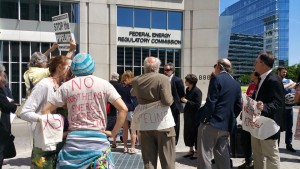On May 14, the Federal Energy Regulatory Commission in its monthly open meeting took up the issue of the electrical grid’s vulnerability to geomagnetic disturbances. But the government agency’s own vulnerability to public disturbance was front and center.
Federal Protective Services took extraordinary measures to prevent disruption of the Commission meeting by planned protests, barring access to about 30 members of the public. FPS also banned the use of recording devices, brushing aside FERC’s own rule expressly permitting it. Two people were escorted out of the meeting room, three arrested and two more detained.
See below for video of FERC meeting plus interviews with protesters
FERC’s actions occurred after the last several Commission meetings were disrupted by protesters who object to FERC’s no holds barred approval of gas infrastructure projects, such as interstate gas pipelines. May’s meeting was originally scheduled for Thursday, May 21, but it was moved up a week to thwart a protest planned by coalition group Beyond Extreme Energy, which has stepped up the pressure on the formerly obscure agency.
Denied entry to the auditorium, demonstrators took it to the lobby. Their loud chants of “Shut FERC down! Shut FERC down!” were heard in the background.
Banned from Entry

“I feel like FERC is destroying democracy in this process,” said Steve Norris of coalition group We Are Cove Point, who wasn’t allowed to enter. “FERC has denied people’s rights, democratic process in community meetings. They really don’t care what is happening in communities. So we came here because we have no forum other than being disruptive and forcing them to listen,” he said.
Security for the “open” meeting was tight. FPS officers recorded each person’s name and phone number and searched bags thoroughly. Dozens of people were not allowed into the meeting room and were directed to overflow rooms instead, even though empty seats remained in the auditorium. Security personnel had singled them out by affixing blue dots to their name tags.
People from several states, including Virginia, North Carolina, Rhode Island, Massachusetts, Connecticut and Pennsylvania, had come to FERC headquarters to voice their concerns. Norris said that about half of those barred had never been there before. He speculated that electronic surveillance of BXE communication may have put those people on a list to be culled from the crowd. “Someone is looking over their shoulders,” he said.
Breaking Its Own Rules

As soon as the meeting was called to order, Patty Cronheim of Hopewell Township, NJ stood up and shouted, then left the room at security’s request. Soon after, Angela Switzer of Delaware Township, NJ was told to leave as well. Both are affected by the Penn East Pipeline.
A statement was read by the Secretary which was clearly intended to address any protesters in the room. It reiterated the gag rule FERC instituted in March, which forbids “disruptive behavior” and “communications made… by unscheduled presenters.”
Yet one portion of the new rule–which expressly allows members of the public to use audio and visual equipment–was ignored. Apparently with the Commission’s blessing, FPS told audience members to stop recording.
Hear No Evil

FERC has escalated efforts to maintain order at its meetings. Last month, an abundance of officers from Federal Protective Services (a division of Homeland Security) prowled the room and warned that disruption would result in a permanent ban. Six protesters were ejected.
The agency has insinuated that protesters are dangerous, saying that it needed to reschedule the Commissioners meeting “to better ensure the safety of its staff and the public during the protests planned for May 21 at FERC headquarters.”
All demonstrations up to now, however, have been peaceful, and participants in major protests planned for May 21 – 29 at FERC headquarters have pledged to be nonviolent.
Commissioner Tony Clark took the opportunity to praise natural gas as a crucial energy source. He asked people to “consider an alternate reality” without natural gas. It would be “a very, very scary place,” he said. “Thank goodness” for those states who cultivate their natural resources, he said. “Because of it, we’re in a much better place.”
The Rubberstamp Agency
FERC’s actions have become controversial as a tidal wave of infrastructure to transport gas produced by hydraulic fracking intrudes on property owners and communities. FERC never fails to approve pipelines, earning it the nickname “rubberstamp agency.”
Frustrated by FERC’s intransigent bureacracy, those affected by giant pipelines, compressor stations and LNG terminals around the country are now circumventing the process.
Since September, hundreds have been arrested blockading the gates of an underground gas storage facility next to Seneca Lake in New York in the belief that a collapse of the salt cavern would poison the drinking water of a 100,000 people.
On May 13, Josh Fox, director of acclaimed documentary Gasland, was arrested at the Crestwood facility. Fox said that FERC acts “like a subsidiary of the fossil fuel industry masquerading as a government agency.”
“FERC has to be overhauled. FERC is a disaster,” he said. “There is no public participation that has any meaning and it is very, very unclear how those decisions are being made.”
FERC recently declined to revisit the approval of Cove Point LNG, an export terminal on the shores of the Chesapeake Bay, which will be a crucial hub for fracked gas from Pennsylvania on its way to India and Japan. The liquefaction of natural gas is highly energy intensive and dangerous, and the site is located in a neighborhood populated by thousands of people. FERC took several months to make a ruling on rehearing the certificate, a delay which critics say was intentional and has helped Dominion Resources get a jump on construction before faults in the project’s application can be contested in court.
Last November, FERC headquarters was blockaded for an entire work week by demonstrators intent on proving that gas infrastructure projects are negatively impacting their communities.More protests are planned later this month. Beyond Extreme Energy predicts that more than 500 people will participate in the protests.

